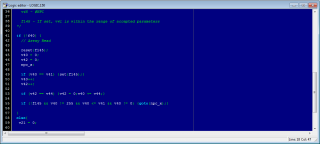Difference between revisions of "AGIWiki/Logic editor"
(fixing link text) |
(creating wikilinks) |
||
| Line 3: | Line 3: | ||
[[File:AGIWiki AGI Studio 1.38b Logic Editor.png|thumb|320px|AGI Studio's logic editor]] | [[File:AGIWiki AGI Studio 1.38b Logic Editor.png|thumb|320px|AGI Studio's logic editor]] | ||
Nowadays AGI developer should have no trouble finding suitable logic editor, as [[:Category:AGIWiki/Integrated development environments for AGI|AGI IDEs]] such as [[AGIWiki/AGI Studio|AGI Studio]], [[AGIWiki/WinAGI|WinAGI]] and [[AGIWiki/QT AGI Studio|QT AGI Studio]] each provide own, internal editor. However, in the 1990s available logic editors were mostly separate MS-DOS-applications with exception of [[AGIWiki/Alex Simkin|Alex Simkin]]'s [[AGIWiki/AGDS|AGDS]], which | Nowadays AGI developer should have no trouble finding suitable logic editor, as [[:Category:AGIWiki/Integrated development environments for AGI|AGI IDEs]] such as [[AGIWiki/AGI Studio|AGI Studio]], [[AGIWiki/WinAGI|WinAGI]] and [[AGIWiki/QT AGI Studio|QT AGI Studio]] each provide own, internal editor. However, in the 1990s available logic editors were mostly separate MS-DOS-applications with exception of [[AGIWiki/Alex Simkin|Alex Simkin]]'s [[AGIWiki/AGDS|AGDS]], which was a commercial product that was the first fanmade [[AGIWiki/AGI|AGI]] [[:Category:AGIWiki/Integrated development environments|IDE]], though it was in Russian and used its own [[AGIWiki/encryption string|encryption string]], making it incompatible with Sierra's games. In 1997 [[AGIWiki/Peter Kelly|Peter Kelly]] released AGI Studio's first version. [[AGIWiki/Helen Zommer|Helen Zommer]] wrote Linux alternative Linux AGI Studio which was ported to Windows by [[AGIWiki/Nat Budin|Nat Budin]] in 2001 as [[AGIWiki/Windows Linux AGI Studio|Windows Linux AGI Studio]]. Linux AGI Studio is currently known as [[AGIWiki/QT AGI Studio|QT AGI Studio]]. | ||
While almost all of those environments can and will save their sources to external files with possible documentation editable with any texteditor, most environments provide useful features such as syntax highlighting, running compiler and debugging. | While almost all of those environments can and will save their sources to external files with possible documentation editable with any texteditor, most environments provide useful features such as syntax highlighting, running compiler and debugging. | ||
Latest revision as of 15:52, 21 January 2014
Nowadays AGI developer should have no trouble finding suitable logic editor, as AGI IDEs such as AGI Studio, WinAGI and QT AGI Studio each provide own, internal editor. However, in the 1990s available logic editors were mostly separate MS-DOS-applications with exception of Alex Simkin's AGDS, which was a commercial product that was the first fanmade AGI IDE, though it was in Russian and used its own encryption string, making it incompatible with Sierra's games. In 1997 Peter Kelly released AGI Studio's first version. Helen Zommer wrote Linux alternative Linux AGI Studio which was ported to Windows by Nat Budin in 2001 as Windows Linux AGI Studio. Linux AGI Studio is currently known as QT AGI Studio.
While almost all of those environments can and will save their sources to external files with possible documentation editable with any texteditor, most environments provide useful features such as syntax highlighting, running compiler and debugging.
